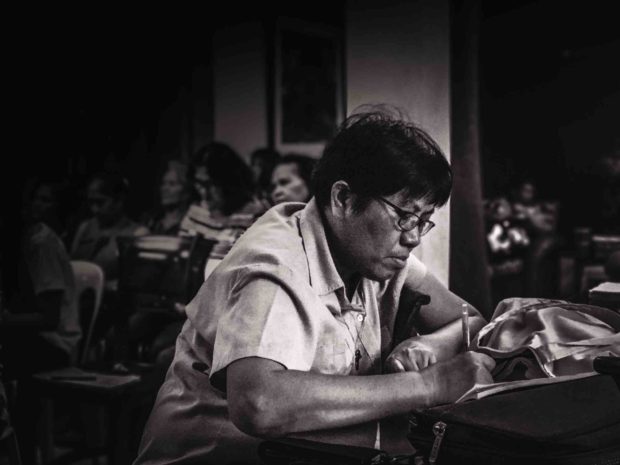Women of Manila ‘killing field’ count on power of silence

Sister Juanita “Nenet” Daño is the driving force behind a class suit filed in October against the Manila police.—PHOTO BY AIE BALAGTAS SEE
Every Monday afternoon, inside a low-cost housing unit in the slums of San Andres Bukid, a group of women from around Manila’s Sta. Ana district gathers in front of an altar that has a tarpaulin sheet for a backdrop.
On their knees, they pray in silence — for 30 uninterrupted minutes — to seek an end to the deaths and violence that have traumatized their neighborhood as the government waged a war on drugs.
Nothing read, nothing recited, nothing ritualized. Just private, half-hour conversations with God.
The prayers, while varying in each woman’s inner church, are centered on the one message written on the tarp: “Stop the Killing, Start the Healing.”
And, according to the Catholic nun who organizes the weekly gathering, they also hope to have an effect on one particular man.
What the women of San Andres Bukid are performing is the “Adoration for Duterte’s Conversion,” said Juanita “Nenet” Daño of the Good Shepherd Sisters.
“It’s a form of sacrifice to stay silent for a long period of time,“ Daño said in an Inquirer interview. “Offering silent prayers is more difficult than uttering them out loud. I believe it’s also more meaningful.”
Rising body count
Drawing as many as 25 women, the adorations have been going on for the past three months in a community that has seen one of the highest number of drug suspects killed since the President launched a bloody campaign against narcotics upon assuming office in June last year.
Daño was one of the religious workers who were the first to sound the alarm over the rising body count in San Andres Bukid. Almost single-handedly, she soon started documenting the cases of residents gunned down either in police operations or vigilante-style attacks by masked men on motorbikes.
She recalled that day when one of the women traumatized by the killings asked: “Are we going to just sit around here and watch? What are we going to do about this?”
With nothing to offer but her strong faith, Daño proposed that they meet weekly for an adoration, “which is the second most powerful form of prayer, after the Mass.”
Sister Nenet believes that their effort is bearing fruit.
For one, it gave them the courage to hale authorities to court. The killings that Daño recorded in detail, including eyewitness testimonies, were compiled to become part of a class suit accusing members of the Manila Police District (MPD) of carrying out summary executions of drug suspects in the guise of “legitimate” raids.
Case vs MPD Station 6
The class suit demanded justice for a total of 35 residents killed from July 2016 to September this year. It was filed in the Supreme Court on Oct. 18 by the slain suspects’ relatives, who decried how the MPD, particularly officers under Station 6, had turned their neighborhood into “a veritable killing field.”
The complainants found crucial legal support from the Center for International Law, a human rights advocacy group.
It took Daño about year to document the cases by interviewing the grieving families, giving them comfort while convincing them to go on record and still trust the legal system.
“I always remind them that iba yung namatay sa pinatay (dying is different from being murdered),” she said.
Turning feisty, Daño noted how the drug war had been mainly claiming the lives of the poor but unable to touch those behind the P6.4-billion “shabu” shipment from China that passed through customs before it was intercepted in a Valenzuela City warehouse in May.
And for someone who draws strength from stillness and contemplation, she hopes that her work in San Andres would show that silent prayer is the best fuel for decisive action.
“Hindi puwede ‘yung ipagpapasa-Diyos na lang (It’s not enough to just wait for divine intervention),” Daño said.